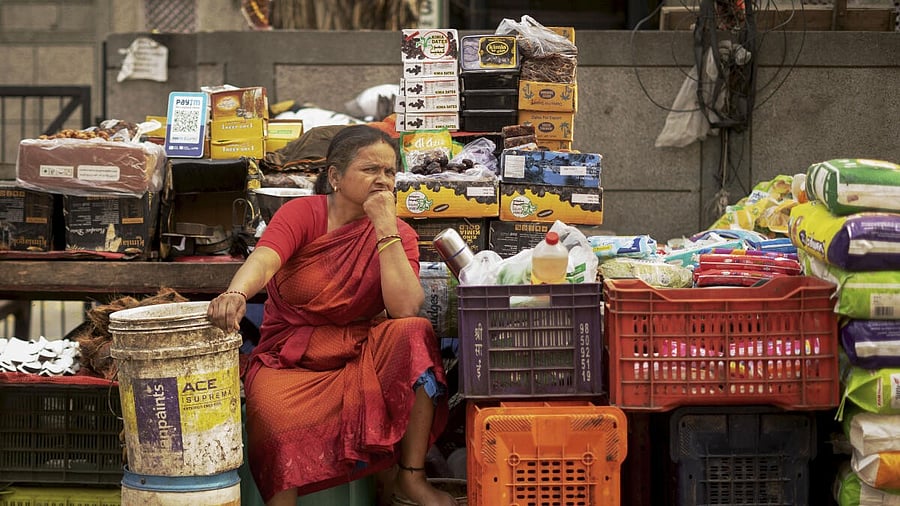
Street vendors are often evicted across the BBMP\ limits, but they return because street vending is seen as a basic right to livelihood.
Credit: PTI Photo
Food carts, eateries, junk jewellery, mobile accessories, clothes, books… You name it; Church Street, Museum Road and Rest House Road have it. Many street vendors make their living on the footpath on these roads.
However, this also sometimes blocks pedestrians’ space. Residents and shop owners are irked by garbage from the hawkers, traffic jams, and blocked entrances to homes and shops.
Sanjay Kumar, president of Church Street Residents Welfare Association, points out that the food prepared here has no certification by the Food Safety and Standards Authority of India, and there are no fire hazard controls used while they use gas stoves on footpaths to cook.
“The Church street Residents Welfare Association had a meeting on September 4. We have provided all the papers regarding footpath encroachment. The BBMP official confirmed she will take action, but till today, nothing has been done,” he says.
“If they don’t do it soon, we residents will have to block the street and protest during Dasara,” he warns.
Street vendors are often evicted across the Bruhat Bengaluru Mahanagara Palike (BBMP) limits, but they return because street vending is seen as a basic right to livelihood.
The decade-old chronology
In 2013, the Supreme Court ruled that street vendors have a fundamental right to livelihood under Article 19(1)(g) of the Constitution. The court said that street vendors (hawkers) have a right to earn a livelihood through vending. While this case did not specifically instruct BBMP to form hawking zones, it laid the foundation for street vendors’ rights across India.
The Street Vendors (Protection of Livelihood and Regulation of Street Vending) Act, 2014 was influenced by this judgment and subsequent legal efforts to protect vendors’ rights. This act required local bodies like BBMP to designate hawking zones, leading to the call for such zones in Bengaluru.
In 2017, the Karnataka High Court ordered that street vendors cannot be evicted before a survey of vendors is conducted as per the Act.
The Court directed the BBMP to expedite the creation of hawking zones and take immediate steps to implement the provisions of the Street Vendors Act after conducting a comprehensive survey of vendors and identifying suitable hawking zones across the city. Hawking zones are supposed to have proper facilities such as toilets, drinking water, and footpath space and be located in traditional market areas (natural markets).
In 2018, the BBMP conducted a survey and identified around 25,000 street vendors in Bengaluru. It proposed 85 hawking zones across the city. However, this was met with resistance from residents, shopkeepers, and other groups, slowing its implementation. In 2020, the BBMP formed Town Vending Committees and resumed efforts to designate hawking zones.
Conflicts over space in busy areas and a lack of comprehensive planning hampered the efforts. During Covid, widespread eviction of street vendors faced opposition, and the court intervened to stop it.
In 2023, the Karnataka High Court reprimanded BBMP for failing to properly demarcate hawking zones and set a timeline for implementing the zones as per the 2014 Act.
Eviction continues
Today, the BBMP is yet to finalise hawking zones or even conduct the street vendor survey.
Babu, president of the street vendors association in Bengaluru, explains the problem: “The court order says no one can be evicted without a proper street vendor survey. Even last week, the cops came and evicted us. We had to go to court immediately, and the court intervened to stop it.”
Last month, more than 200 street vendors were evicted in the Shivajinagar area. “We were told to vacate the space for ten days when the local Church had functions. Later, we were not allowed to go back. Poor vendors have been unable to operate for the last month and ten days,” says Fayaz Ali, a street vendor from Shivajinagar.
The vendors are now planning to seek the court’s help because the BBMP plans to survey street vendors soon, and those not selling on the streets cannot be considered vendors.
Such eviction of street vendors continues across the city. The BBMP seems to have got stuck in a catch-22 situation here, without being able to strike a compromise between locals, street vendors and regular shops, and being unable to find spaces agreeable for all for hawking zones.
“A survey was done in 2017, but it is not legal because the rules came out in 2020. A fresh survey needs to be done by the BBMP,” says Vinay Sreenivasa, an advocate representing street vendors in courts.
Spaces identified as ‘natural markets’ should be designated as hawking zones. However, in some cases, the vendors are asked to go to a different area where they will lose their regular customers or where there is insufficient footfall. There is a proposal for the evicted vendors in Shivajinagar to go to Hennur, which is not at all useful for their business, says Sreenivasa.
Hawkers have settled below metro pillars, near Banashankari metro station. Khadar, a vendor, says that creating a footpath there will not shrink the space for vehicles because the road is 100 ft wide.